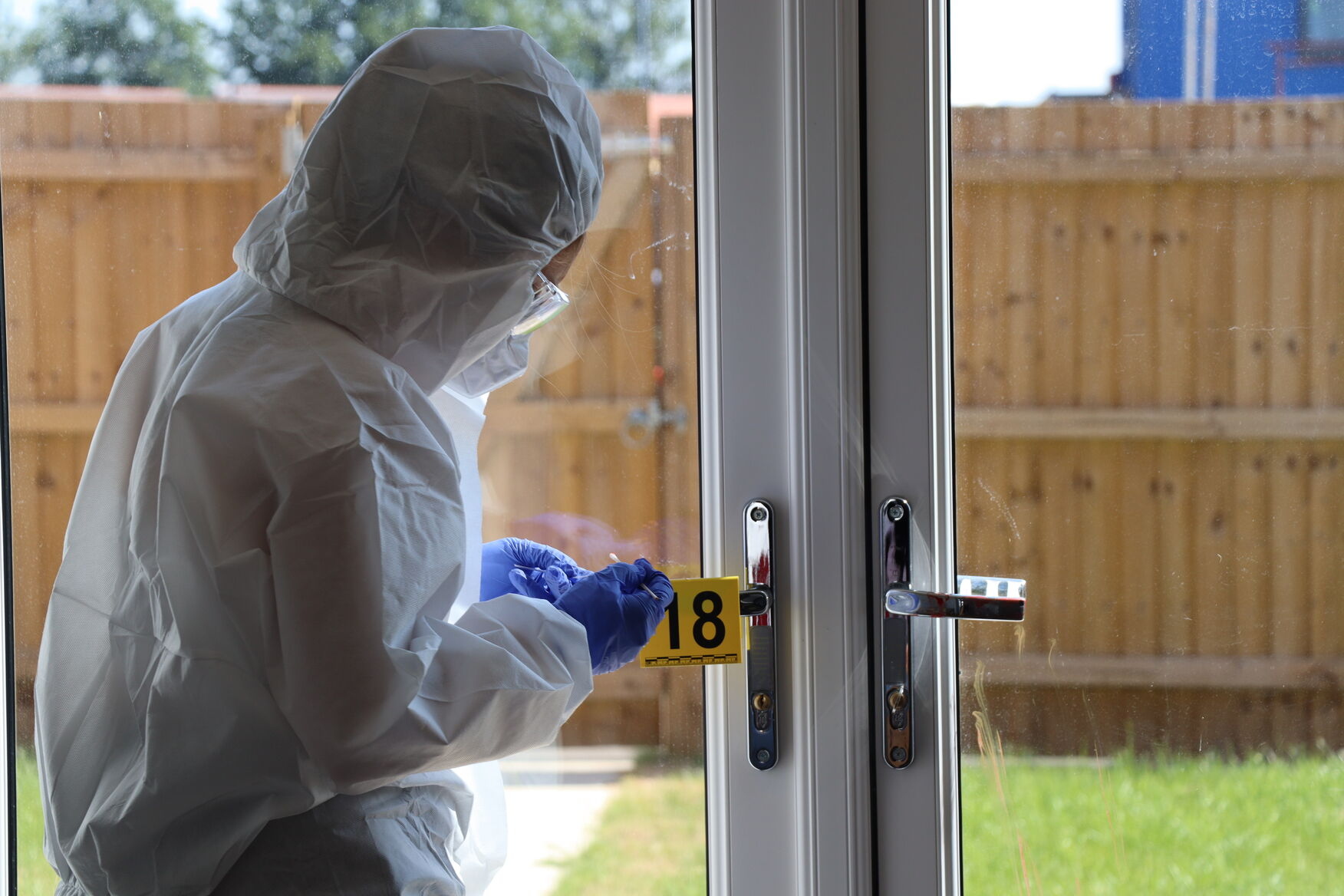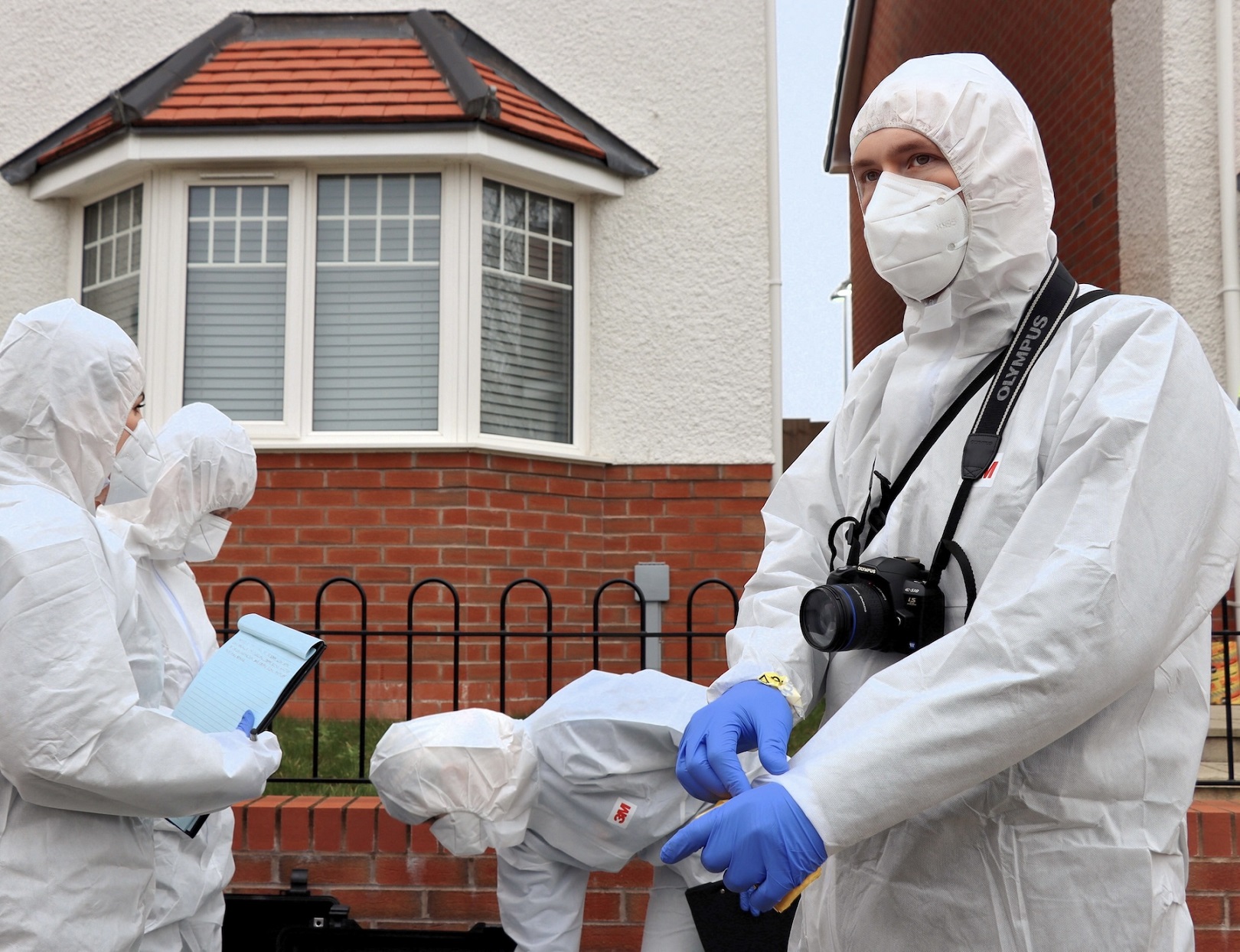MSc Forensic Science

Course details
Year of entry
2026
Duration
1 YR (FT)
Institution Code
G53
Location
Wrexham
Course Highlights
Gain
real-world experience through industry links
Engage
in research-led teaching
Develop
courtroom-ready communication skills
Why choose this course?
Our MSc Forensic Science blends lab and fieldwork with scenarios based on real-world crime scenes. With access to specialist facilities and expert staff, you’ll gain advanced skills in forensic analysis, anthropology, and taphonomy, preparing you for a range of careers in forensic science and beyond.
You Will:
- Learn from active researchers and practitioners in forensic science, taphonomy, and anthropology
- Gain real-world experience through industry links
- Have the option to pursue an Advanced Practice route or an entrepreneurship module for additional career focus
- Be part of a small, supportive cohort ensuring intensive practical training and personal research supervision
- Prepare for careers in forensic services, law enforcement, archaeology, heritage and research
Key course features
- Access our DEFRA-licensed taphonomy facilities, one of the few in the UK, for unique decomposition and body recovery training
- Work in our crime scene house, mock courtroom, osteology workroom, and 3D imaging suites
- Develop courtroom-ready communication skills with expert witness training and mock trials
- Undertake practical, field-based modules including crime scene management, forensic anthropology, and archaeology
- Build advanced analytical and laboratory skills in biological, chemical and trace evidence examination
- Engage in research-led teaching, including dissertation and experimental research opportunities
What you will study
Year One (Level 7)
This MSc delivers an intensive, hands-on postgraduate education in forensic science, combining core research skills with specialist training in crime scene management, expert witness testimony, forensic anthropology, archaeology, taphonomy and advanced laboratory skills. You’ll study five modules totalling 180 credits, blending academic research with immersive practical experience in the lab, field, and courtroom.
MODULES:
Forensic Anthropology & Archaeological Field Skills (30 credits) – Specialist: Combine advanced osteological analysis with field-based archaeological training. You’ll examine human remains to create biological profiles and assess skeletal trauma, pathology and taphonomic change. Alongside lab work, you’ll take part in immersive fieldwork where you’ll practise excavation, recording and recovery techniques in line with professional archaeological standards. This module prepares you for specialist roles in forensic anthropology, field recovery, and heritage management.
Experimental Taphonomy (30 credits) – Specialist: Explore the science of decomposition through a blend of experimental design and advanced analytical techniques. This module introduces you to key post-mortem processes and their forensic significance, including environmental and contextual effects on human remains. You'll gain practical experience with laboratory methods that support taphonomic investigation such as chemical analysis, imaging techniques, and environmental data logging. Using these skills, you'll develop and pitch your own research proposal, including equipment selection, ethical considerations, and budgeting preparing you for real-world research funding and forensic casework.
Crime Scene Management & the Expert Witness (30 credits) – Specialist: Train to lead complex forensic investigations. This module uses simulated crime scenes to teach you how to make operational decisions, manage contamination risks, coordinate with other agencies and communicate effectively under pressure. You’ll also learn to document your findings to legal standards and practise giving expert evidence in a mock courtroom setting. This highly applied module prepares you for leadership roles and the realities of working within legal and regulatory frameworks.
Advanced Research Methods (30 credits): You will develop the essential skills to plan, design and pitch your own forensic research. You’ll learn how to conduct a critical literature review, formulate research questions, apply ethical standards and explore statistical methods using software such as SPSS. Through interactive workshops, you’ll gain the confidence to present your ideas clearly and persuasively; skills vital for both your dissertation and future career. This module provides a solid foundation for applied forensic research in academic, professional, or policy-based settings.
Dissertation (60 credits) – Core: This is your opportunity to conduct a significant, original piece of forensic research. You’ll choose a specialist area of interest, then design, implement and evaluate your project with guidance from an academic supervisor. Whether lab-based, fieldwork-led or literature-focused, your project will draw on all the skills you’ve developed throughout the course. You’ll produce a journal-style article and present your findings through an oral defence, preparing you for professional research or PhD-level study.
Entry requirements & applying
A 2:2 classification or above from a Bachelor’s Honours degree in any subject area.
Teaching & Assessment
How you'll be taught
Teaching on this programme is delivered through a dynamic mix of lectures, seminars, practical workshops, and immersive field experiences. You’ll engage in:
- Simulated crime scenes in our purpose-built crime scene house
- Mock courtroom sessions, where you’ll practise delivering expert witness testimony in a realistic legal setting
- Lab-based sessions using specialist forensic equipment and analytical tools
- Field schools and excavation training for archaeological recovery and documentation
- One-to-one dissertation supervision with expert researchers and practitioners
The course is structured around small group teaching to ensure personalised learning, especially in practical and professional skill areas such as forensic anthropology, crime scene management, and taphonomy.
How you'll be assessed
Assessment methods are varied and designed to reflect real-world forensic tasks, ensuring you graduate with both academic knowledge and applied skills. These include:
- Crime scene simulations and live practical assessments
- Professional-standard reports, such as expert witness statements and lab analyse
- Oral presentations and reflective tasks
- A written grant proposal for experimental research funding
- A full research dissertation presented in a journal-style format and oral defence (viva)
There are no traditional written exams. Instead, all assessments are coursework-based, supporting the development of critical thinking, scientific communication, and professional competencies relevant to careers in forensic science, research, and beyond.
Teaching and Learning
We offer workshops and support sessions in areas such as academic writing, effective note-making and preparing for assignments.
Students can book appointments with academic skills tutors dedicated to helping deal with the practicalities of university work. Our student support section has more information on the help available.
In terms of particular needs, the University’s Inclusion Services can provide appropriate guidance and support should any students require reasonable adjustments to be made because of a recognised prevailing disability, medical condition, or specific learning difference.
Career prospects
Our dedicated Careers and Employability team is committed to helping you achieve your professional goals. They provide personalised advice, useful resources, and extracurricular employability events to prepare you for the job market.
Graduates of this course can pursue careers in:
- Cadaver Dog Handler
- Archaeological Field Technician
- Coroners Officer
- Analytical Chemist
- Quality Control Microbiologist
- Mortuary Technician
- Medical Laboratory Assistant
- Visiting Lecturer
- Forensic Science Technician
- PhD Researcher
Whether you're advancing your current career, changing direction, or preparing for further academic study, this MSc gives you the practical and intellectual foundation to thrive.
Fees & funding
You do not have to pay your tuition fees upfront.
The fees you pay and the support available will depend on a number of different factors. Full information can be found on our fees & finance pages. You will also find information about what your fees include in the fee FAQs.
All fees are subject to any changes in government policy, view our postgraduate fees.
International
This course is open to international students, for information about the university’s entry requirements for EU/international students, please visit our international section.
